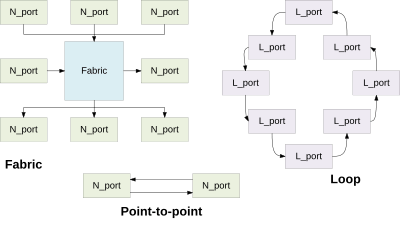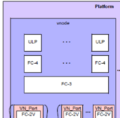Fibre Channel facts for kids
Fibre Channel, often called FC, is a special way that computers connect to storage devices, like hard drives. Think of it as a super-fast highway for data! It's mainly used in large computer systems called Storage Area Networks (SANs). These networks help many computers share the same storage.
Today, Fibre Channel systems can move data at amazing speeds, like 4 or 8 gigabits per second. This speed is usually sent over special fiberglass cables. Fibre Channel is great because it lets several computers connect to the same storage system at the same time.
Contents
How Fibre Channel Connects Devices
There are two main ways, or topologies, that Fibre Channel devices can be connected:
Arbitrated Loop Connections
This method connects all the devices in a circle, or a "loop," similar to a ring shape. Imagine everyone holding hands in a circle to pass a message around. In this setup, devices share the connection. This way of connecting is often chosen because it avoids using special Fibre Channel Switches, which can be very expensive.
Fabric Connections
In a "Fabric" setup, all devices connect to central Fibre Channel Switches. This is a lot like how a regular Ethernet network works, where all your computers plug into a central switch. While this method is very powerful and flexible, it costs more because Fibre Channel Switches are quite expensive.
Images for kids
See also
 In Spanish: Canal de fibra para niños
In Spanish: Canal de fibra para niños
 | James Van Der Zee |
 | Alma Thomas |
 | Ellis Wilson |
 | Margaret Taylor-Burroughs |









